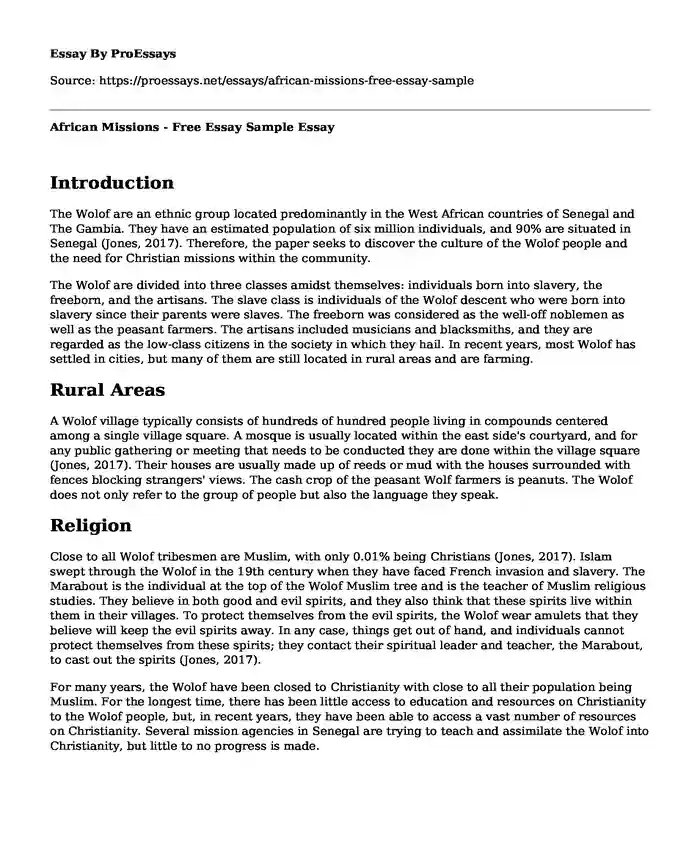Introduction
The Wolof are an ethnic group located predominantly in the West African countries of Senegal and The Gambia. They have an estimated population of six million individuals, and 90% are situated in Senegal (Jones, 2017). Therefore, the paper seeks to discover the culture of the Wolof people and the need for Christian missions within the community.
The Wolof are divided into three classes amidst themselves: individuals born into slavery, the freeborn, and the artisans. The slave class is individuals of the Wolof descent who were born into slavery since their parents were slaves. The freeborn was considered as the well-off noblemen as well as the peasant farmers. The artisans included musicians and blacksmiths, and they are regarded as the low-class citizens in the society in which they hail. In recent years, most Wolof has settled in cities, but many of them are still located in rural areas and are farming.
Rural Areas
A Wolof village typically consists of hundreds of hundred people living in compounds centered among a single village square. A mosque is usually located within the east side's courtyard, and for any public gathering or meeting that needs to be conducted they are done within the village square (Jones, 2017). Their houses are usually made up of reeds or mud with the houses surrounded with fences blocking strangers' views. The cash crop of the peasant Wolf farmers is peanuts. The Wolof does not only refer to the group of people but also the language they speak.
Religion
Close to all Wolof tribesmen are Muslim, with only 0.01% being Christians (Jones, 2017). Islam swept through the Wolof in the 19th century when they have faced French invasion and slavery. The Marabout is the individual at the top of the Wolof Muslim tree and is the teacher of Muslim religious studies. They believe in both good and evil spirits, and they also think that these spirits live within them in their villages. To protect themselves from the evil spirits, the Wolof wear amulets that they believe will keep the evil spirits away. In any case, things get out of hand, and individuals cannot protect themselves from these spirits; they contact their spiritual leader and teacher, the Marabout, to cast out the spirits (Jones, 2017).
For many years, the Wolof have been closed to Christianity with close to all their population being Muslim. For the longest time, there has been little access to education and resources on Christianity to the Wolof people, but, in recent years, they have been able to access a vast number of resources on Christianity. Several mission agencies in Senegal are trying to teach and assimilate the Wolof into Christianity, but little to no progress is made.
Conclusion
Therefore, there is a vast need for missions to be conducted among the Wolof of Senegal to increase Christianity following through radio and many other evangelistic tools among the Wolof. The few believers that are within the Wolof community should as well help with the mobilization and teaching of the Christian beliefs to their fellow Wolof community.
Reference
Jones, H. (2017). Fugitive slaves and Christian evangelism in French West Africa: a protestant mission in late nineteenth-century Senegal. Slavery & Abolition, 38(1), 76-94. https://www.tandfonline.com/doi/abs/10.1080/0144039X.2016.1193972.
Cite this page
African Missions - Free Essay Sample. (2023, Nov 25). Retrieved from https://proessays.net/essays/african-missions-free-essay-sample
If you are the original author of this essay and no longer wish to have it published on the ProEssays website, please click below to request its removal:
- Essay Sample on Mixed Economy
- Research Paper on Universities in China: Leveraging Information, Innovation and E-Learning
- Essay Example on Women's Leadership in Church: Bible vs Culture
- Essay on Mexicans and Blacks in the USA: Uncovering Racial Discrimination
- Essay Example on Family Planning and Medication Policies at CMHPSM
- Report on Revolutionary Alliance: Past and Present Goals for China's Liberation and Reconstruction
- Essay Sample on International Dimensions of National Conflict







